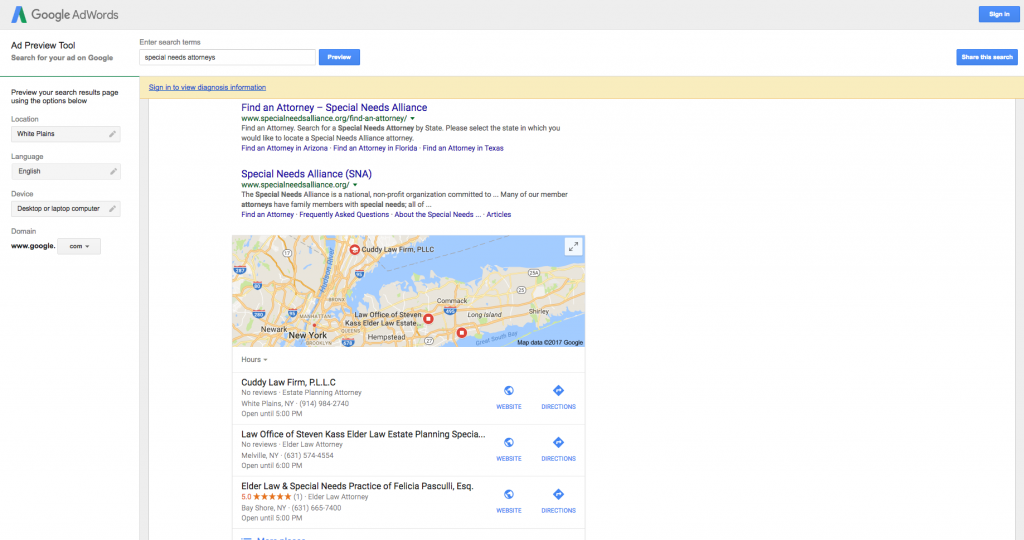Middle of the Pack: Changes in the Local Map Landscape
BY Dexter Tam

LISTEN
In some keyword searches on Google, the local pack is no longer at the top of the search engine results page.

You have probably become accustomed to seeing a map at the top of Google's search results page when searching for a local business. In results, the map comes first, followed by what is known as a 3-pack of map listings. Organic results and ads are displayed below the map. However, this logic may be changing.
When conducting research on trends in legal search, BLF noticed something new: Results occur for which the local map is not at the top. Instead, organic search results with no advertisements are shown above the local map finder. Only when Google assumes that you are looking for something in your vicinity, when performing a local search, it places the map first in listings.
In one instance, a quarterly keyword rankings report revealed that six out of 47, or 13 percent, of the keyword searches BLF tested contained organic search result listings that display above the local map and local 3-pack.
The outcome is not staggering, but it could be prevalent enough to warrant SEO adjustments, depending on the terms for which your firm is optimizing.
What does Google hope to achieve?
Google frequently tweaks its algorithm in order to adapt to user trends and behaviors. Moz estimates that Google changes its algorithm 500-600 times every year. Google is constantly testing to try to determine how best to serve users. In this golden age of information, where knowledge is at our fingertips, convenience — the ability to say, hey, the map's right here — may no longer be the foremost priority in search results. With so much accessibility to data and material, authority and relevance may be taking more precedence among the myriad metrics that determine rankings.
Could Google be giving preference to organic page listings?
If Google is giving slight preference to non-local, organic listings, will the 3-pack no longer sit as top-prized real estate? As Google attempts to increasingly tailor results to specific users, this shift could be specific to individual searchers. If a user is frequently searching for specific market queries, Google could be giving this user the opportunity to see highly-personalized search results.
To promote the top-quality, organically ranked web pages while demoting the local map could be the result of an analysis of user behavior. If people are willing to scroll further down to find what they are looking for, and are doing so consistently, Google may be testing to see how moving the map affects this behavior. Organic page listings are generally the best match for what people truly want to find with their searches.
How does this affect SEO?
If Google's placement of organic listings above the map, 13 percent of the time, is foreshadowing a more serious trend, then it will mean that a website with high authority, that Google sees as a leader in its industry, is capable of ranking higher than a local business, even for a local search term. This seems to prove that having an exceptional website can trump convenience. Despite not getting the expanded listing that a website on the local map receives, which includes ratings, reviews and hours of operation, being at the top of page one increases opportunities for conversations, word-of-mouth referrals and gives searchers confidence that your website is the best resource.
How will the local SEO landscape change if Google moves the map?
If Google does indeed start rolling out additional changes to its algorithm that positions the map lower in the results, the potential future for local SEO will diminish. There will be less of an emphasis on local optimization. Marketers will likely put more priority on keyword search queries, topic optimization and improving their respective websites for enriched search engine results through the use of schema markup. All of these tactics will be of benefit because the most effectively optimized pages will reap greater rewards. However, local businesses that previously thrived because the convenience of their locations was prioritized for searchers may suffer.
What is causing the shift?
At this point, marketers can only speculate, but this change could be one outcome of a local algorithm update Google rolled out in September of 2016, nicknamed Possum. Possum is an update designed specifically for local search. Its goal is to diversify local search query outcomes and prevent spam from reaching the local results. Among the known changes are:
- 1. Local businesses outside the physical city limits of a highly populated metropolis saw an increase in ranking. Now, offices in the suburbs can compete for the same keywords as a business operating in the city, which used to be out of reach to them.
- 2. Local results are receiving enhanced address filtering. For example, if a large firm has multiple listings for different departments that are in different suites but located at the same physical address, only one of those listings will appear in the map.
- 3. Search results show differences with only slight keyword variations. For example, “Bay Area Estate Planning Attorney” and “Estate Planning Attorney in the Bay Area” yield different results on the local map.
- 4. The physical location of the searcher is now more important. Google is looking at the IP address of a searcher and placing priority on the searcher's physical location over local keywords.
Google Possum is a fairly new update, live for less than six months. More changes will be discovered as search marketers work to uncover the intricacies of the update. And only time will tell if the local map will see more upheaval in the months to come.
LATEST STORIES



